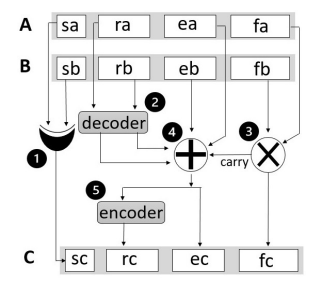Fixed-Posit: A Floating-Point Representation for Error-Resilient Applications
Also Available Domains Cadence EDA|Arithmetic Core|Xilinx Vivado
Abstract
Abstract:
IEEE-754 floating point is the standard used today to represent real numbers in practically all computer systems. Recently, posit—which offers superior accuracy and a wider dynamic range—was suggested as a substitute for IEEE-754 floating point. Posit may be customized to have a different amount of regime and exponent bits, which has prevented widespread use. We suggest a fixed-posit format to address this flaw and show the construction of a fixed-posit multiplier. In this representation, the number of regime and exponent bits are fixed. Using the AxBench, OpenBLAS, and neural network benchmarks as well as error-tolerant applications, we assess the fixed-posit multiplier. When compared to posit multipliers, the proposed fixed-posit multiplier saves 47%, 38.5%, 22%, and up to 70%, 66%, 26% of the power, area, and latency of the 32-bit IEEE-754 multiplier, respectively. For workloads using OpenBLAS and AxBench, these savings come with a negligible output quality reduction (1.2% average relative error). Additionally, we see a tiny accuracy reduction (0.12%) when using the fixed-posit multiplier for neural networks like ResNet-18 on ImageNet.
Keywords: IEEE-754 floating point, Posit, Multipliers, Intel Pin, Power and Error analysis
NOTE: Without the concern of our team, please don't submit to the college. This Abstract varies based on student requirements.
Block Diagram

Specifications
Specifications:
Software Requirements:
· Xilinx Vivado
Hardware Requirements:
· Microsoft® Windows 7
· Intel® i3 processor or equivalent with SSE support
· 4GB RAM
· 100 MB of available disk space
Learning Outcomes
Learning Outcomes:
- Introduction to VLSI
- Basics of Digital circuits
- Limitations & Applications.
- Introduction to adders
- Knowledge on different types of multipliers
- Applications
- Introduction to posit multiplier
- Working of posit multiplier
- Applications
- Importance of Verilog
- Xilinx Vivado tool for design and simulation
- Solution providing for real time problems
- Project Development Skills:
- Problem Analysis Skills
- Problem Solving Skills
- Logical Skills
- Designing Skills
- Testing Skills
- Debugging Skills
- Presentation skills





 Paper Publishing
Paper Publishing
